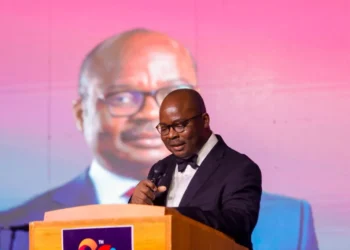Kristalina Georgieva, the Bulgarian economist currently serving as the Managing Director of the International Monetary Fund (IMF), is on the brink of securing a second five-year term at the helm of the prestigious financial institution.
With her initial term set to conclude at the end of September, Georgieva’s bid for reappointment hinges upon garnering support from major European nations and the United States, a critical step in ensuring the success of her candidacy.
Since assuming office in 2019, Georgieva has steered the IMF through a tumultuous period marked by global economic challenges exacerbated by the COVID-19 pandemic. Her leadership has been characterized by a commitment to addressing issues of financial stability, debt relief, and economic recovery, earning her widespread recognition for her expertise and resilience in navigating complex international economic landscapes.
Georgieva’s bid for a second term as head of the IMF comes with the implicit backing of key European powerhouses, namely France and Germany. These two nations, representing the largest economies in Europe, are pivotal in shaping the consensus necessary for Georgieva’s reappointment. According to sources familiar with the matter, Georgieva’s pursuit of a second term is underpinned by assurances of support from both France and Germany, underscoring the significance of European unity in determining the leadership of the IMF.
The tradition of a European national leading the IMF dates back to the institution’s inception, reflecting a post-World War II understanding between European nations and the United States. This arrangement, whereby Europe selects the head of the IMF while the U.S. chooses the president of the World Bank, has endured for decades, rooted in a desire to maintain geopolitical balance and ensure effective leadership within the Bretton Woods institutions.
Meetings Of Group Of 20 Finance Ministers
Meetings of Group of 20 finance ministers last week in Brazil focused attention on the issue, with French Finance Minister Bruno Le Maire saying that Georgieva is doing a “great job” and that his country would back her if she sought another term.
A German senior official also disclosed that Finance Minister Christian Lindner is sympathetic to appointing Georgieva for another term, but that a formal confirmation is still at least a few days away.
When asked whether she’s interested in a second term in recent weeks, Georgieva has repeatedly deflected, saying that she’s focused on her current term.
At a press briefing, IMF spokeswoman Julie Kozack declined to say whether Georgieva is interested in serving a second term, calling it “really a question for the managing director herself.” Kozack referred to the IMF’s rules for choosing the chief, who officially is chosen by the fund’s 24-member Executive Board, with the objective to reach a selection by consensus
Georgieva’s support from the US, the fund’s biggest voting member, wavered following accusations in 2021 that she improperly influenced a World Bank ranking of China’s business climate.
The IMF and its sister institution, the World Bank, emerged from World War II as key pieces of the US-led order, focused, respectively, on helping countries recover from financial crisis and providing loans for development projects.
Georgieva, 70, led the fund’s efforts to aid indebted countries through the pandemic and has more recently warned about the global economic impact of trade fragmentation caused by worsening US-China relations.
EU leaders are set to partake in another round of horse-trading over top jobs later this year, including for the posts atop the European Commission and NATO, which requires striking a balance between different political, geographic and strategic interests.
While the fund’s executive board elects the leader in a vote, the support of Europe and the US – together accounting for around half of all voting shares — would make it tough for other candidates to surmount.
Georgieva moved from the World Bank to take the top IMF job in 2019, a position she won in part because she was from an Eastern European nation, a region typically underrepresented in top institutional positions.
READ ALSO: GSE Trades Flat: What It Means to Investors





















